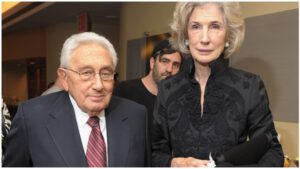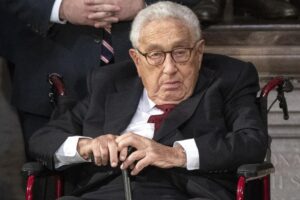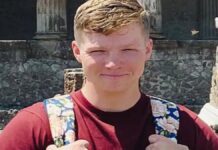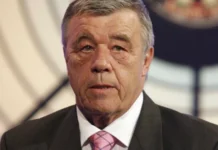Henry Kissinger, is an American diplomat, political scientist, geopolitical consultant, and politician, held the positions of United States Secretary of State and National Security Advisor during the presidential administrations of Richard Nixon and Gerald Ford.
Bio/Wiki
Age- 100 years
Height- 1.73 m
Full name- Henry Alfred Kissinger
Born- 27 May 1923
Birthplace- Fürth, Germany
Died- 29 November 2023, Connecticut, United States
Spouse- : Nancy Kissinger (m. 1974), Ann Fleischer (m. 1949–1964)
Profession- Former United States Secretary of State
Nationality- American, German
Family
Heinz Alfred Kissinger, born on May 27, 1923, in Fürth, Bavaria, Germany, was the son of Paula, a homemaker from Leutershausen, and Louis Kissinger, a schoolteacher. He had a younger brother, Walter (1924–2021), who pursued a career in business.
Wife
On February 6, 1949, Kissinger married with Anneliese “Ann” Fleischer, but the union concluded in divorce in 1964. In 1955, he met Austrian poet Ingeborg Bachmann at a Harvard symposium, leading to a romantic involvement that endured for several years. Subsequently, on March 30, 1974, Kissinger tied the knot with Nancy Maginnes.


Children
Together with Anneliese, Kissinger was a parent to two children, namely Elizabeth and David and five grandchildren. David Kissinger, his son, went on to work as an executive at NBC Universal Television Studio and later assumed the role of the head of Conaco, Conan O’Brien’s production company, in 2005.
Education
During his high-school years in the Washington Heights section of Upper Manhattan, Kissinger was part of the German-Jewish immigrant community. Despite assimilating into American culture swiftly, he retained a distinct German accent due to childhood shyness. After his first year at George Washington High School, he worked in a shaving brush factory during the day and attended school at night. Post-high school, he pursued accounting at the City College of New York, excelling academically as a part-time student while continuing to work. His studies were interrupted in early 1943 when he was drafted into the U.S. Army. In 1950, Kissinger achieved a summa cum laude Bachelor of Arts in political science from Harvard College. During his time at Harvard, he resided in Adams House and studied under the guidance of William Yandell Elliott. He was also inducted into the Phi Beta Kappa honor society.
Career
After basic training at Camp Croft in Spartanburg, South Carolina, Kissinger, at the age of 20, became a naturalized U.S. citizen on June 19, 1943. Stationed in South Carolina, he was initially sent for engineering studies at Lafayette College, Pennsylvania, but the program was canceled. Subsequently reassigned to the 84th Infantry Division, Kissinger, fluent in German, caught the attention of fellow immigrant Fritz Kraemer. Recognizing Kissinger’s intellect and language skills, Kraemer arranged for him to join the military intelligence section of the division. Kissinger actively participated in combat with the division and willingly volunteered for hazardous intelligence duties during the Battle of the Bulge.
Kissinger held the positions of National Security Advisor and Secretary of State under President Richard Nixon and retained the role of Secretary of State during Nixon’s successor Gerald Ford’s tenure. Following the passing of George Shultz in February 2021, Kissinger became the sole surviving member of the Nixon administration Cabinet.
Initially indifferent to China when he assumed the role of National Security Adviser in 1969, Kissinger’s engagement with China was primarily driven by President Nixon. In April 1970, both Nixon and Kissinger assured Taiwan’s leader, Chiang Ching-kuo, of their commitment not to abandon Taiwan or compromise with Mao Zedong. Despite his limited interest in China at the start, Kissinger played a key role in the rapprochement.
Before his appointment as National Security Adviser, Kissinger was involved in Indochina, consulting for Ambassador Henry Cabot Lodge in Saigon. He visited Vietnam in 1965 and twice in 1966, realizing the complexities of the Vietnam War.
Nixon’s support for Pakistani dictator General Yahya Khan in the 1971 Bangladesh Liberation War, and Kissinger’s role in détente with the Soviet Union, marked his tenure. He negotiated the SALT I treaty and the Anti-Ballistic Missile Treaty with Soviet leader Leonid Brezhnev.
In September 1973, Kissinger replaced William Rogers as Secretary of State. Concerned about Soviet influence in the Persian Gulf, he monitored conflicts such as the Iran-Iraq dispute. In 1974, faced with the Greek junta coup and the Turkish invasion of Cyprus, Kissinger navigated complex diplomatic challenges.
Kissinger called for a “new dialogue” with Latin America in 1973, leading to an agreement with Panama’s Foreign Minister Juan Antonio Tack on the Panama Canal in 1974, providing a framework for the 1977 U.S.–Panama treaties. Following Nixon’s resignation in the Watergate scandal, Kissinger’s influence in Gerald R. Ford’s new administration waned when he was replaced by Brent Scowcroft as National Security Advisor in the “Halloween Massacre” cabinet reshuffle of November 1975. Kissinger left his role as Secretary of State when Jimmy Carter defeated Gerald Ford in the 1976 presidential elections.
In his later writings and interviews, including the 2011 book “On China,” the 2014 book “World Order,” and a 2018 Financial Times interview, Kissinger expressed his belief that China aims to reclaim its historical position as the Middle Kingdom and become the “principal adviser to all humanity.”
In 2020, amid escalating Sino-American tensions due to the COVID-19 pandemic, Hong Kong protests, and the U.S.–China trade war, Kissinger warned of a potential Second Cold War and feared a military conflict akin to World War I. He urged Chinese leader Xi Jinping and U.S. President-elect Joe Biden to adopt a less confrontational foreign policy, emphasizing the catastrophic consequences of a war between the two powers.
In July 2023, Kissinger traveled to Beijing, meeting with Chinese Defense Minister Li Shangfu, previously sanctioned by the U.S. in 2018. Kissinger stressed the importance of harmonious Sino-American relations, advocating for the elimination of misunderstandings and peaceful coexistence. During the same visit, he met with Xi Jinping, aiming to thaw relations between the U.S. and China.


Achievement/ Awards
- Nobel Peace Prize (1973): Henry Kissinger and Lê Đức Thọ were jointly awarded the Nobel Peace Prize in 1973 for their efforts in the Paris Peace Accords, which led to the withdrawal of American forces from the Vietnam War. However, Lê Đức Thọ declined the award, citing that true peace had not been achieved in Vietnam. Kissinger donated his prize money to charity, did not attend the award ceremony, and later offered to return his prize medal after the fall of South Vietnam.
- S. Senator John Heinz Award (1973)
- Honorary Harlem Globetrotter (1976)
- Presidential Medal of Freedom (1977)
- National Book Award in History (1980)
- Medal of Liberty (1986)
- Honorary Knight Commander (1995)
- Sylvanus Thayer Award (2000)
- Honorary Member of the International Olympic Committee (2002)
- Israel’s President’s Medal (2012)
- Henry A. Grunwald Award for Public Service (2013)
- Founding Council Member (University of Oxford)
Net Worth 2023
Henry Kissinger’s wealth amounted to $400 million.
Cause of Death
Henry Kissinger, the former US Secretary of State, known for his pivotal and divisive role in Cold War foreign policy, has passed away at the age of 100.
He held the position of America’s foremost diplomat and national security adviser throughout the Nixon and Ford administrations.
Even after his departure from office in the mid-1970s, he remained a trusted advisor, consulted by leaders across generations.
The former diplomat, originally from Germany, passed away at his residence in Connecticut.


The statement released on Wednesday night by Kissinger Associates, the consultancy founded by Henry Kissinger, did not provide information regarding the cause of his death.
Former US President George W Bush led the tributes, expressing that the US had lost one of the most reliable and distinctive voices in foreign affairs.
President Richard Nixon’s daughters, Tricia Nixon Cox and Julie Nixon Eisenhower, remarked on the uniqueness and thoroughly American nature of Kissinger’s life story.
The statement continued, emphasizing that Henry Kissinger would be remembered for his numerous accomplishments in promoting peace, with a lasting emphasis on the enduring impact of his character.












































